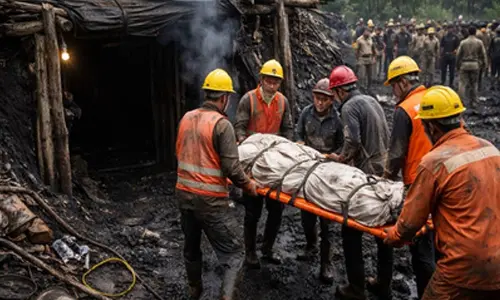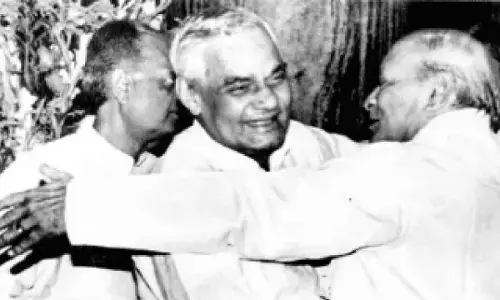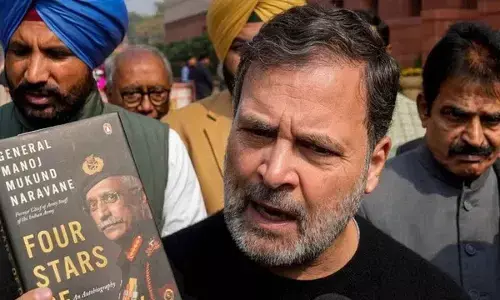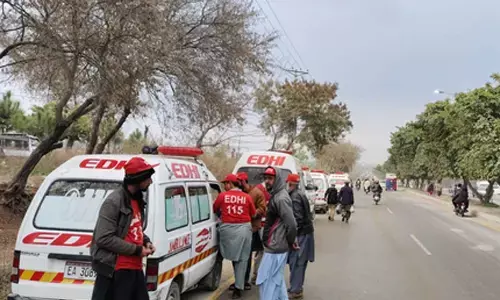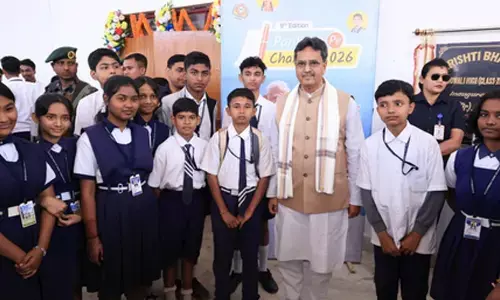Farmers' crusade against farm-harm Acts
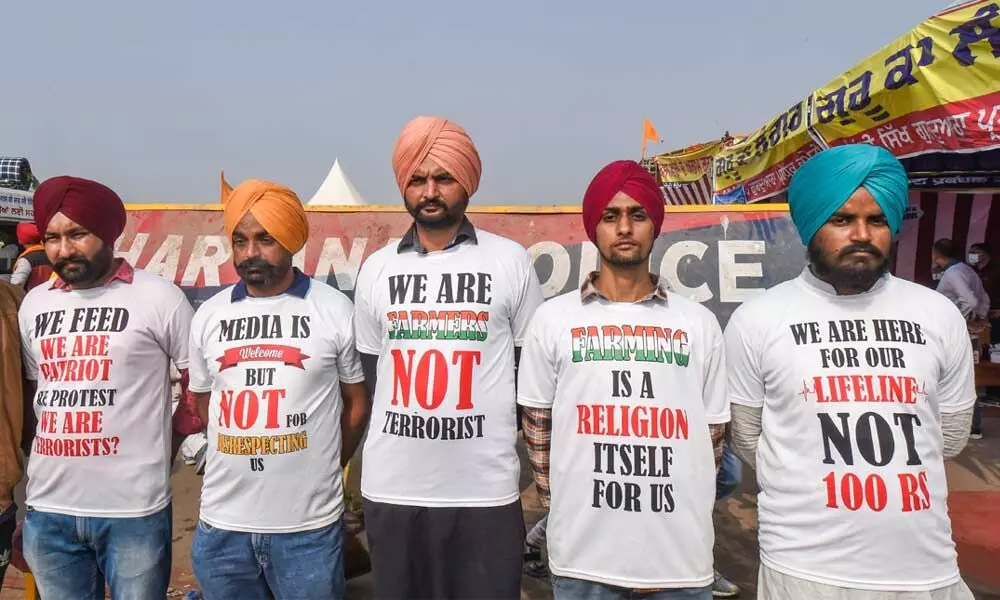
Farmers’ crusade against farm-harm Acts
It is a threat to food security
It is a threat to food security. It has potential to make owners of agriculture land up to five acres, slaves and sub-servants of corporate agricultural contractors. It deprives annadaatas of the State support. The majority of population did not understand these simple consequences, so-called educated are refusing to apply their minds, but farmers understood it. Women, children and tillers of north India from different States have moved on to roads, expressing dissent with solidarity, resistance to dealers in governance as the real leaders are a scarce commodity for either ruling or Opposition parties. They are braving water canons during chilling winter, crossing concrete barricades, feeding the armed forces who came to stall them, marching towards the rulers who are not ready to hear or see the opposition to their anti-farmer legislations.
Farm activist Kavitha Kuruganti from Alliance for Sustainable & Holistic Agriculture (ASHA) explained the main objections to the three farm Bills in one paragraph: "The government hasn't done what farmers have been asking for many years now – to enhance and guarantee MSP, to strengthen bargaining power of small farmers in the market, to enhance their capacity to store, process and sell at an advantage, as well as to free them from indebtedness. On the other hand, it has done the opposite, to create unregulated space for agribusiness companies and traders, to weaken 'mandis' which even with flaws provided farmers a space for collective bargaining and government intervention in their favour. It is saying, "We are giving the corporations more freedom to purchase, store and process, they will give you (farmers) better price."
Farmers don't buy this and see this as the government washing its hands off all responsibility and rightly so. It is pitting farmers against powerful entities in a more unequal playing field now. We don't have any evidence of this kind of de-regulation providing better and stable prices to farmers. With the new laws, the fact is that poor farmers and poor consumers have been left to their fate. Farmers are asking the government why MSP cannot be the legally guaranteed floor price".
Another question is "why are the farmers' protests limited mainly to Punjab, Haryana and western UP?" Kavitha answered: "the proximity of these places to Delhi makes the national media think that protests are limited to these States, whereas Karnataka has been on the boil and protests have been happening in other south Indian States, Bengal, Odisha etc. The responses from farmers have understandably been correlated to how dependent they already are on the mandi system in a given location. The government's reform should have focused on improving such a mandi system everywhere in the country and bring it to a farmer-empowering uniform level rather than weakening or dismantling it."
It is a wonder that people agitated first and leaders are joining latter and the farmer's agitation is uniting the Opposition parties. A joint statement was signed by Congress president Sonia Gandhi, Nationalist Congress Party (NCP) chief Sharad Pawar, National Conference leader Farooq Abdullah, DMK president M K Stalin, Samajwadi Party chief Akhilesh Yadav, CPI(M) general secretary Sitaram Yechury, CPI's D Raja, RJD's Tejashwi Yadav and CPI (ML)'s Dipankar Bhattacharya among others. Separately Shiv Sena, Telangana Rashtra Samithi and Telugu Desam expressed their support.
They are asking the Centre to listen to the 'legitimate' demands of our Kisans-Annadatas. The Opposition leaders said, "We the undersigned leaders of political parties extend our solidarity with the massive struggle by the farmers organised by various kisan organisations from across the country and extend our support to their call for Bharat Bandh on December 8 demanding the withdrawal of these retrograde agri-laws and the Electricity Amendment Bill".
The joint statement says: "These new laws, passed in Parliament in a brazen anti-democratic manner preventing a structured discussion and voting, threaten India's food security, destroy agriculture and our farmers, lay the basis for the abolishment of the minimum support price and mortgage agriculture and our markets to the caprices of multi-national agri-business corporates and domestic corporates."
When Cabinet Ministers are either timid or blindly devoted or never allowed to discuss or the farm-harm ordinances or bills are not on agenda for discussion in Council of Ministers, the scope for democratic debate on constitutionality or justifiability for these changes is totally diminished. When the Parliament or Chairpersons of its two Houses - Lok Sabha and Rajya Sabha - blatantly violate parliamentary democratic processes, the scope of legislative check is diminished. And when already a judicial pronouncement is clearly ruling as precedent against the prolonged protest, the scope of judicial review of pro-market and anti-farmer Bills is also diminished. What could have been discussed in Cabinet or Parliament or courts or at least on forum of objective media are being discussed on the roads to Delhi, or in the negotiating table forced by massive march of farmers to Delhi. Where is the grammar of anarchy in pushing an ordinance in pandemic or pulling out Bills from Parliament with the help of deputy chairman, or on the roads where farmers are facing water cannons of police forces or concrete barricades of inhuman and unconstitutional governance?
Thus, there are no hopes in Executive, where the Ministers do not dare to voice on these Bills, in Legislature where treasury bench MPs keep their mouths shut, and in an irresponsible way the opposition disorganised, and the in judiciary which has already set a precedent to prevent occupation of public places. Most Chief Ministers belong to ruling coalition, who do not bother about provisions that harm agriculturists. Hyderabad voters are bothered about change of city's name or Bhagylakshmi mandir leaning on one of four Minars of Charminar, not about crumbling four Minars of Democracy – three estates plus lapdog media are falling on farmers. Some irresponsible social media postings ask for demolition of Charminar and Makka Masjid after being emboldened by win of around 50 seats in GHMC elections.
We do not have voters in our country, we have Hindus, Muslims etc and consumers. The consumer who eats processed food, does not know that a farmer is providing raw material for making the food polluted by processors at his own cost. Farmers in India face many challenges such as climate change and the vagaries of the monsoon, expensive and patented seeds, poor soil quality, pests and the challenges of using pesticides that may be harmful as well, price fluctuations in the market, back-breaking work, challenges of getting credit. As a cumulative result of these challenges, most of the farmers grow food at a net loss. The civilised lazy youth do not know that most of farmers who grow our food don't have enough food or money to feed their own families! They either do not hear the news of suicides of farmers or nor bother even if some media reported it. They are bothered when onions price is soared to Rs 40 per kg, but the Sarkar came to their rescue by banning export of onions and helping middlemen who deal in onions. Dealers or leaders?
Those who eat without thinking about how food is grown, do not know that India has 24 per cent of the world's malnourished people, 30 per cent of the children under five have stunted growth, which is the highest percentage in the world. At the same time, thanks to the lazy youth, the obesity is fast becoming a nationwide problem.
IndiaSpend has explained that 'about 42 per cent of India's land area is facing drought', which the voters do not care to know, and great number of blind followers of Hindu and Muslim religion-based political parties ignore these issues deliberately looking to their places of worship for winning elections.
The voters of Hyderabad are wasting their time and democratic process, who efficiently invalidated their 77,509 votes, or those 28,604, who came to booths but voted for None of the Above, and the 38 lakh plus voters, lazy and irresponsible who never turned to polling booths while two thirds of those voted on emotions and communal lines have successfully destroyed the democracy without even caring to look at what is happening on highways to Delhi. Do they deserve democracy?
(The writer is Professor of Law, Bennet University and former Central Information Commissioner)










